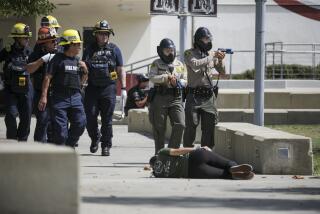Bill Reforming Jury Service Signed by Wilson
- Share via
SACRAMENTO — Gov. Pete Wilson gave frustrated prospective jurors a big gift Tuesday, but they will have to wait more than a year to open it.
The governor signed a bill that, beginning Jan. 1, 2000, requires jurors to be seated on their first day of jury duty or they are free to go home for the rest of the year.
Nearly half the state’s counties, including Orange and Ventura, already have moved in this direction. But Los Angeles had not been among them, often insisting that jurors come back day after day for 10 days to sit in a jury room or march from courtroom interview session to courtroom interview session.
The legislation, carried by state Sen. Bill Lockyer (D-Hayward), also means that once a seated juror has completed a trial, regardless of its length, the juror’s obligation is complete.
“Jury service is our civic duty,” Wilson said in a statement. “But our current system has become too burdensome for most hard-working men and women of California.”
The new law, opposed by the state Department of Finance because of the potential for increased court summons costs, grew out of a study by the state Judicial Council, which provides administrative oversight for California’s courts.
In its May 1996 report, the Judicial Council declared that “the jury system . . . is on the brink of collapse” in part because jury service is deemed too bothersome by prospective jurors.
Of the nearly 4 million Los Angeles County residents mailed court questionnaires in 1994-95, only 10% ultimately showed up for jury service, the report found. Though some were legally excused, a third simply ignored the summons.
In crafting the legislation, Lockyer decided that more jurors probably would appear if the experience were not so fraught with uncertainty, his spokesman said Tuesday. The American Bar Assn. agreed, based on the experience of states with a similar one-day, one-trial system.
Lockyer’s spokesman, Nathan Barankin, said jurors dislike showing up one day only to be sent home and told to come back the next, without knowing when the limbo will end.
“Folks don’t show up for a lot of reasons, but employers are more likely to be receptive to their employees doing jury service if they know it’s one day, one trial,” Barankin said. “More people will respond to their summons knowing they will not waste their time.”
The jury service bill was one of several signed Tuesday by the governor, including measures to develop a vaccine for “valley fever,” add 60,000 felons to the state’s DNA database and lower fees for resident graduate students.
The bill dealing with valley fever requires state health officials to create a Valley Fever Project to develop a vaccine for the deadly fungal disease.
The project--under the auspices of the state Department of Health Services--will be funded with $3 million in this year’s state budget. The bill was introduced by Assemblyman Roy Ashburn (R-Bakersfield).
Between 1991 and 1993, there were more than 10,000 cases of valley fever reported in the Central Valley, resulting in 280 deaths.
The disease is caused by a tiny airborne fungus that is inhaled into the lungs. Symptoms can be similar to the flu or meningitis.
Under another bill signed Tuesday, California will add DNA samples from 60,000 felons to its database. That will make it easier for law enforcement to use DNA technology to match suspects with crimes.
Now, the state can draw blood for DNA tests from people convicted of felony sex offenses, murder and felony assault and battery. The bill by Assemblyman Kevin Murray (D-Los Angeles) adds 21 crimes to the list, including voluntary manslaughter, kidnapping, mayhem, torture and felony spousal abuse.
DNA is an individual’s genetic fingerprint; no two DNA profiles are alike, except for identical twins. Police can often extract DNA samples from evidence at a crime scene. It then can be compared to DNA from a suspect.
Wilson also signed legislation giving graduate students at the University of California and California State University a 5% fee cut in the 1999-2000 academic year. The bill was introduced by Sen. Steve Peace (D-El Cajon).
The Legislature last year reduced fees by 5% for undergraduates, beginning this fall.
Times wire services contributed to this story.
More to Read
Get the L.A. Times Politics newsletter
Deeply reported insights into legislation, politics and policy from Sacramento, Washington and beyond. In your inbox twice per week.
You may occasionally receive promotional content from the Los Angeles Times.










